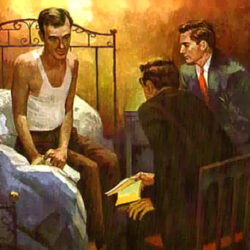
Web Chair
The Web Chair maintains District 28’s website by ensuring the meeting information and upcoming events are up to date. Contact the Web Chair for more information.

The Web Chair maintains District 28’s website by ensuring the meeting information and upcoming events are up to date. Contact the Web Chair for more information.

The Literature Chair keeps group, district and area assembly members informed of all available Conference-approved literature, audiovisual material and other special items, through displays and other suitable methods. They should become familiar with the information on G.S.O.’s A.A. website (www.aa.org). They maintain sources of literature and provide literature for groups, area, and district functions. The chair consider suggestions regarding proposed additions to and changes in Conference-approved literature and audiovisual material. They encourage A.A. members to read and purchase A.A. literature.

The purpose of a corrections committee is to coordinate the work of individual A.A. members and groups who are interested in carrying our message of recovery to alcoholics behind the walls, and to set up means of smoothing the way from the facility to the larger A.A. community through pre-release contacts. The corrections chair works with city and county jails and the Department of Corrections community supervision offices.

The mission of the Alcoholics Anonymous General Service Office Archives is to document permanently the work of Alcoholics Anonymous, to make the history of the organization accessible to A.A. members and other researchers, and to provide a context for understanding A.A.’s progression, principles and traditions. Consistent with A.A.’s primary purpose of maintaining our sobriety and helping other alcoholics achieve recovery, the Archives of Alcoholics Anonymous will: Receive, classify and index all relevant material, such as administrative files andrecords, correspondence, and literary works and artifacts considered to have historical importance to Alcoholics Anonymous; Hold and preserve such material; Provide access to these materials, as determined by the archivist in consultationwith the trustees’ Archives Committee, to members of Alcoholics Anonymous andto others who may have a valid need to review such material, contingent upon acommitment to preserve the anonymity of our members; Serve as a resource and laboratory to stimulate and nourish learning; Provide information services to assist the operations of Alcoholics Anonymous; Promote knowledge and understanding of the origins, goals and program ofAlcoholics Anonymous.

Treatment Committees are formed to coordinate the work of individual A.A. members and groups who are interested in carrying our message of recovery to alcoholics in treatment and outpatient settings, and to set up means of “bridging the gap” from the facility to an A.A. group in the individual’s community. BASIC FUNCTIONS OF TREATMENT COMMITTEES 1. With approval of administration, takes A.A. meetings into treatment settings within its area. 2. Encourages group participation. In some areas each group has a representative on the Treatment Committee. 3. Coordinates temporary contact programs, such as Bridging the Gap. 4. Arranges purchase and distribution of literature for these groups and meetings.

“When anyone, anywhere, reaches out for help, I want the hand of A.A. always to be there. And for that: I am responsible.” Accessibility challenges apply to all alcoholics who have difficulties participating in Alcoholics Anonymous, whether those are mental, physical, geographic, cultural, or other factors that vary among people. Some of these alcoholics may experience barriers to accessing the A.A. message, including the literature, meetings, Twelve Step work, and the service structure. Alcoholics come in all shapes and sizes. Generally, the Accessibilities committee reaches out primarily to persons who are blind or and/or deaf, have hearing and/or vision loss, those who are housebound or chronically ill, those who are living with the effects of brain injury or stroke, and many others who may have various kinds of abilities. Barriers to the message of Alcoholics Anonymous are not always readily evident.

Cooperating with nonalcoholic professionals is an effective way to carry the message to the sick alcoholic. Such people often meet the alcoholic in places where A.A. is not present. Through professionals, alcoholics may be reached who might otherwise never find the program, or they may be reached sooner with the help of informed non-A.A.s. Here is a list of jobs and professions that C.P.C. committees have approached: alcoholism or substance abuse counselors; armed forces officers, unit commanders or military chaplains; athletic coaches; corrections officers; court officials; educators; employers or employee assistance professionals; health care professionals (doctor, nurse, psychiatrist, psychologist, etc.); clergypersons; judges; juvenile services professionals; law enforcement officers; lawyers (prosecutor, defense attorney); probation or parole professionals; professional students; public health officials; senior services professionals; social workers; union officials. A professional can be a family doctor or other health care professional, a member of the clergy, a law enforcement or court official, an educator, a social worker, an alcoholism or other counselor, or anyone who deals with problem drinkers in the course of their work. Many of these people often encounter the suffering alcoholic, and in spite of public awareness, many of them simply don’t know what to do with a […]